新目标英语八年级上期末复习知识点总结
八年级上册英语知识点归纳整理
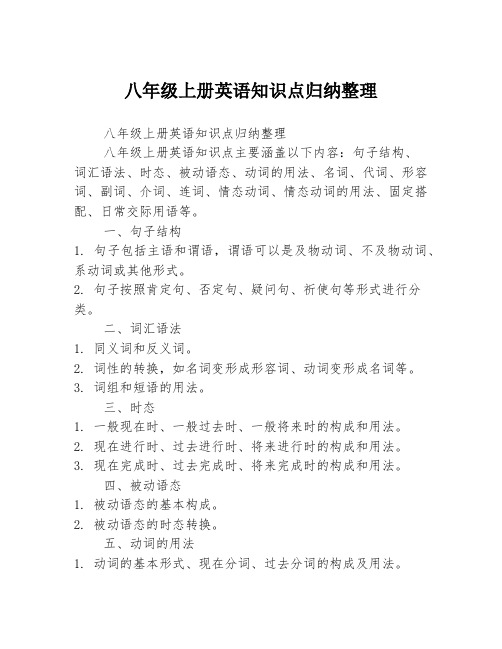
八年级上册英语知识点归纳整理八年级上册英语知识点归纳整理八年级上册英语知识点主要涵盖以下内容:句子结构、词汇语法、时态、被动语态、动词的用法、名词、代词、形容词、副词、介词、连词、情态动词、情态动词的用法、固定搭配、日常交际用语等。
一、句子结构1. 句子包括主语和谓语,谓语可以是及物动词、不及物动词、系动词或其他形式。
2. 句子按照肯定句、否定句、疑问句、祈使句等形式进行分类。
二、词汇语法1. 同义词和反义词。
2. 词性的转换,如名词变形成形容词、动词变形成名词等。
3. 词组和短语的用法。
三、时态1. 一般现在时、一般过去时、一般将来时的构成和用法。
2. 现在进行时、过去进行时、将来进行时的构成和用法。
3. 现在完成时、过去完成时、将来完成时的构成和用法。
四、被动语态1. 被动语态的基本构成。
2. 被动语态的时态转换。
五、动词的用法1. 动词的基本形式、现在分词、过去分词的构成及用法。
2. 动词的逻辑主语和关系代词。
六、名词1. 单数名词和复数名词的区别,复数名词的构成规则。
2. 可数名词和不可数名词的区别。
七、代词1. 人称代词、物主代词、反身代词的用法。
2. 指示代词、不定代词的用法。
八、形容词1. 形容词的一般用法。
2. 最高级和比较级形容词的构成和用法。
九、副词1. 副词的一般用法。
2. 最高级和比较级副词的构成和用法。
十、介词1. 常见的介词及其用法。
十一、连词1. 常见的连词及其用法。
十二、情态动词1. can、could、may、might、shall、should、will、would、must、need等情态动词的用法。
十三、情态动词的用法1. 表示能力、可能性、许可、请求、建议、必须等。
2. 情态动词表将来时态的用法。
十四、固定搭配1. 常见的固定搭配及其用法。
十五、日常交际用语1. 日常交际中常用的问候语、道歉、表示感谢等用语。
以上为八年级上册英语知识点的归纳整理,涵盖了语法、词汇、句型、语用等多个方面的内容。
人教版新目标八年级英语上册各单元重点单词和短语梳理归纳
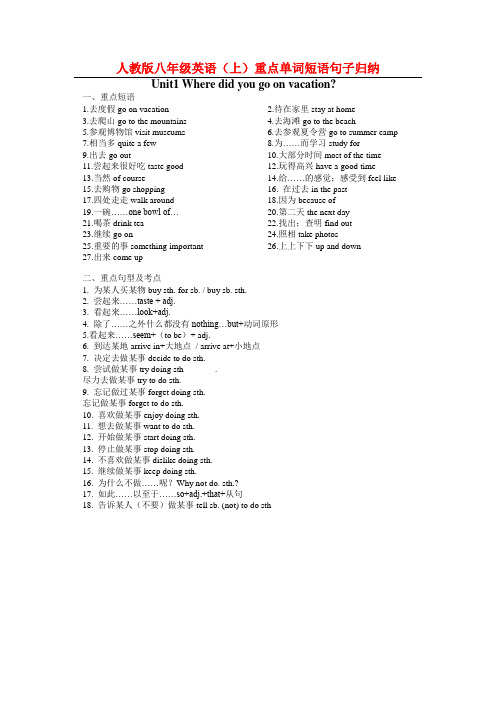
人教版八年级英语(上)重点单词短语句子归纳Unit1 Where did you go on vacation?一、重点短语1.去度假go on vacation2.待在家里stay at home3.去爬山go to the mountains4.去海滩go to the beach5.参观博物馆visit museums6.去参观夏令营go to summer camp7.相当多quite a few8.为……而学习study for9.出去go out 10.大部分时间most of the time 11.尝起来很好吃taste good 12.玩得高兴have a good time13.当然of course 14.给……的感觉;感受到feel like 15.去购物go shopping 16. 在过去in the past17.四处走走walk around 18.因为because of19.一碗……one bowl of… 20.第二天the next day21.喝茶drink tea 22.找出;查明find out23.继续go on 24.照相take photos25.重要的事something important 26.上上下下up and down27.出来come up二、重点句型及考点1. 为某人买某物buy sth. for sb. / buy sb. sth.2. 尝起来……taste + adj.3. 看起来……look+adj.4. 除了……之外什么都没有nothing…but+动词原形5.看起来……seem+(to be)+ adj.6. 到达某地arrive in+大地点/ arrive at+小地点7. 决定去做某事decide to do sth.8. 尝试做某事try doing sth .尽力去做某事try to do sth.9. 忘记做过某事forget doing sth.忘记做某事forget to do sth.10. 喜欢做某事enjoy doing sth.11. 想去做某事want to do sth.12. 开始做某事start doing sth.13. 停止做某事stop doing sth.14. 不喜欢做某事dislike doing sth.15. 继续做某事keep doing sth.16. 为什么不做……呢?Why not do. sth.?17. 如此……以至于……so+adj.+that+从句18. 告诉某人(不要)做某事tell sb. (not) to do sthUnit 2 How often do you exercise?一、根据汉语写短语。
人教新目标八年级英语上册期末知识点总复习(二)(学生版)

人教新目标八年级英语知识点总复习基础练习(二)一、单选题1.Who has ________ free time, you, your mum or dad?A.less B.more C.the least D.the fewest2.I think there will be ________ trees and ________ pollution in the future. A.fewer; less B.more; less C.more; fewer D.less. more 3.Lions have _______ land to live on than before. So they are becoming ___ in number. A.less, less B.fewer, fewer C.less, fewer D.fewer, less 4.________ he has no arms or legs, ________ he can look after himself well. A.Although; but B.Because; / C.Although; / D.Because; so 5._________ help the poor, you can give away _________ you consider(认为)best. A.In order that, whatever B.In order that, howeverC.In order to, however D.In order to, whatever6.Please turn the radio up a bit ________ I can hear clearly.A.in order to B.so that C.such as D.because 7.There shouldn’t be a paper factory in this area. , the fish in the river can die. A.However B.Otherwise C.So D.Because 8.—It's smoggy these days. That's terrible.—Yes. I hope to plant trees. ________ trees, ________ air pollution.A.The more; the fewer B.The less; the more C.The less; fewerD.The more; the less9.— Two tickets for Sunday, please!—Sorry, There’s _________ left.A.nothing B.none C.something D.anything 10.________ my father didn't feel well, he worked hard.A.Although B.Because C.So D.But二、完型填空Maria is my friend.She had bad 11 two years ago.For example,she got up late and had 12 for breakfast.She disliked 13 school activities.After 14 home from school,she usually played computer games and 15 she watched TV.She 16drank milk,and she ate junk food three 17 five times a week.Then one day,she got sick.She had to be in hospital 18 .It made her 19 that she must look after herself well.Now Maria has 20 habits.She gets up early and 21 every morning.She usually runs for about an hour.Then she has a 22 breakfast.At school she plays all kinds of sports.She hardly ever plays computer games 23 watches TV.She drinks a cup of milk 24 going to bed.These good habits 25 her keep healthy and study well. 11.A.games B.friends C.programs D.habits 12.A.nothing B.anything C.something D.everything 13.A.to do B.doing C.do D.did 14.A.getting B.to get C.got D.gets 15.A.always B.sometimes C.never D.hardly 16.A.always B.often C.hardly ever D.sometimes 17.A.from B.on C.too D.to 18.A.once a week B.two weeks ago C.for three weeks D.twice a week 19.A.feeling B.feel C.felt D.feels 20.A.bad B.well C.bored D.good 21.A.sleeps B.exercises C.eats D.plays 22.A.easy B.hungry C.healthy D.free 23.A.and B.but C.or D.though 24.A.after B.when C.during D.before 25.A.tell B.help C.want D.take三、阅读单选Many people today like exercise. Some like to run, and some like to walk. Others dance or play b alls. They do different kinds of exercise. Why do people like exercising? It’s good for their health. And exercise helps make them tired, so they sleep better at night.You may like to run. If you do, take care of your feet. Make sure you have the right shoes. Some people like to run on roads, but they must watch out for cars.Walking is a good exercise. You may take a long walk in the park. It’s more fun if you don’t go alone. Go with a friend. The two of you may have a great time.Some people like to swi m. But others don’t like to go into the water. If you like this kind ofexercise, make sure that someone is watching you. You must always take care when you are in the water. Jumping a rope (跳绳) or riding a bike is also good exercise. There are many other exercises. Find out what you like. You may need help at first. Some people often do exercise, and they can help you. Do exercise every day, and you will know what it makes you feel. 26.The passage tells us about ______________.A.running B.swimming C.walking D.exercise 27.If you want to run for exercise, you should ______________.A.have the right shoes B.run fast on the roadsC.go with a friend D.let someone watch you28.They must watch out for cars. Here “watch out” means ______________.A.向外看B.左右看C.小心D.担心29.In the passage there are ______________ kinds of exercise.A.5 B.6 C.7 D.830.Wha t should you do if you want to do exercise?A.Find out what you like. B.Ask for help at first.C.Exercise every day. D.A、B and CThere are four people in my family. They’re my grandfather, my parents and me. My grandfather exercises every day. He never uses the Internet. He eats vegetables three times a day, but he hardly ever drinks milk. And he watches TV every night. My father is a taxi driver. He’s very busy. He n ever exercises, but he sometimes surf the Internet. He watches TV on Saturday and Sunday evening. He often eats vegetables and drinks milk. My mother is a housewife(家庭主妇). She watches TV twice a day. She never surf the Internet. She sometimes eats vegetables, but she drinks milk three times a week. Exercise? Of course she does. She exercises every day by doing housework. I’m a middle school student. I go to school from Monday to Friday. I often exercise. But on Saturday and Sunday, I don’t exercise because I have too much homework to do. I watch TV only on Sunday evening. But I surf the Internet twice a week. I drink milk every day, but I don’t like vegetables. My mother often says to me, “Why do you eat so much meat, Mike? It’s not good for your health.” Bu t I like it very much. 31._____ sometimes surf the Internet in his family.A.Mike and his father B.Mike and his motherC.Mike’s parents D.Mike’s father and grandfather32._____ watch TV every day in his family.A.Mike and his grandfatherB.Mike’s mother an d grandfatherC.Mike’s parentsD.Mike’s father and grandfather33.What does Mike’s father do?A.He often eats vegetable. B.He sometimes surf the Internet.C.He is very busy. D.He is a taxi driver.34.Why don’t Mike exercise on Saturday and Sunday?A.Because he wants to surf the Internet.B.Because he wants to watch TV.C.Because he has too much homework to do.D.Because he has to go to school.35.Mike likes eating _____ very much.A.meat B.vegetables C.fruit D.milkTeenagers believe anything is possible if they study hard. But they often forget to think about healthy diets, enough sleep time and exercise. In fact, these things are really important for them to keep fit.It is important for teenagers to get enough energy. Teenage girls need about 2,200 calories a day while boys need a bit more—doctors suggest 2,800 for teenage boys.50% of their calories should come from healthy food—rice, vegetables and fruit. People often say an apple a day keeps the doctor away. Teenagers also need to drink a lot of water,6 to 8 glasses a day. Drinking enough water will improve their skin.Teenagers usually need eight to ten hours’ sleep at night, but many Chinese teenagers do not get enough sleep. A report shows that without a good night’s sleep, teenagers seem to be weaker than they should be. Too much homework is not the only reason why teenagers stay up late. Some watch TV or play computer games late into the night. Teenagers should develop good study habits.So some clever students never study late, but they are able to work well in class.Exercise is something that can help them. Experts suggest that teenagers should spend at least 30 minutes exercising a day, five times a week. They will feel relaxed when they exercise.It can even help them sleep better at night.36.How many things are important for teenagers to keep fit?A.2. B.3. C.4. D.5.37.Half of their calories should come from.A.rice,vegetables and fruit B.rice,vegetables and meatC.rice,vegetables and water D.milk and meat38.The last paragraph(段) mainly talks about.A.sleeping better B.basic energyC.necessary exercise D.more exercise39.Which of the following is NOT true?A.Boys need much more calories than girls. B.Teenagers need to drink 6 to 8 glasses of water a day.C.Some clever students never study late. D.They will feel relaxed when they exercise. 40.The passage tells teenagers how to .A.eat and drink well B.study hard C.keep fit D.drink wellEating habits are different in many countries. The Chinese have a saying, “Eat good things for breakfast, eat a big meal for lunch, but eat less at dinner.” Many Americans agree that one should start the day with a good breakfast, but their ideas about lunch and dinner are different.Most Americans only give themselves a short time for lunch. So they eat a small meal. After work they will have more time to eat a big dinner. Also a quiet dinner at home with all the family members talking about their day is a way to rest (休息)after a long, hard day of work.Eating at restaurant is also different. In China, people like to talk and laugh while eating. Very often you can hear people talking and laughing loudly, and they are just having a good time. In America, it is not like this. People want a quiet place where they can eat a good meal far away from the noise (噪音)of the outside world. If some people are talking too loudly, the manager (经理)may come out and ask them to leave.41.Which is a good way for keeping healthy in China?A.Eating nothing for breakfast. B.Eating less to lose weight.C.Eating less at dinner. D.Eating what you want.42.How long do most Americans give themselves for lunch?A.The whole noon. B.A long time.C.A short time. D.At the workplace.43.What will the manager of the restaurant do if some people are talking too loudly in America?A.Talk with them happily. B.Ask them to be quiet.C.Ask them to go away. D.Do nothing.第II卷(非选择题)四、用所给单词的正确形式填空44.If you eat________(little)and exercise________(much),you can become healthier.45.To keep healthy, I decide _________ (exercise) half an hour every day.46.Look! Your pet dog is _________ (die).47.Some of my classmates don't like to go ________ (shop).48.You should eat some fruit and vegetables to keep ________ (health).【答案】healthy【详解】句意:你应该吃些水果和蔬菜来保持健康。
初中英语人教新目标八年级上册Unit 6重点知识(重点语块+词形变换+重点句子)

八年级英语上册Unit 6重点知识Section A【重点语块】1.grow up长大;成熟;成长2.practice doing sth.练习做某事3.go to university/college 去上大学4.study math really hard 努力学习数学5.be good at...擅长于……6.a famous writer一位著名的作家7.keep on doing sth.继续做某事8.of course当然9.be sure about确信;对……有把握10.make sure确保;查明11.try one's best尽某人最大的努力12.move to...搬到……13.take acting lessons上表演课14. a race car driver一名赛车手15. send sb. sth./ send sth.to sb.寄给某人某物;寄某物给某人16.want sb. to do sth.想要某人做某事17. become an engineer成为一名工程师18.go to a cooking school去烹饪学校19. study medicine at a university在一所大学学医20.write articles写文章21. send them to magazines and newspapers把它们寄到杂志社和报社22. computer programmer编程人员23. see a doctor看医生24.get an education受教育25. a successful pilot一名成功的飞行员【词形变换】1. program n.程序;节目 v.编写程序→programmer n.程序员2.cook n.厨师v.烹饪→ cooker n.炊具3.violinist n.小提琴手→ violin n.小提琴4.pianist n.钢琴家→ piano n.钢琴5. scientist n.科学家→ science n. 科学→scientific adj.科学的cation n.教育→ educate v.教育→educational adj.有教育意义的→educated adj.受过教育的;有教养的→educator n.教育家;教育工作者7.worry v.担心;担忧→ worried adj.焦虑的;担心的→ worrying adj.令人担忧的;令人发愁的8.medicine n.药;医学→medical adj.医学的9.send v.邮寄;发送→sent (过去式)10.drive v.驾驶;开车→ driver n.驾驶员;司机【重点句子】1.—What do you want to be when you grow up ?1一I want to be an engineer.—你长大后想当什么?—我想当一名工程师。
新目标八年级上册_英语语法知识点精讲+练习

新目标八年级上册英语语法知识点精讲+练习(一)一般将来时一般将来时表示将来某个时间要发生的动作或者存在的状态。
通常与表示将来的时间状语连用,如tomorrow, the day after tomorrow, next year, next month, next week, in 100 years等。
be going to do(动词原形)结构:表示打算、准备做的事情或者肯定要发生的事情。
如:It is going to rain.will do结构表示将来的用法:1. 表示预见Do you think it will rain?You will feel better after a good rest.2. 表示意图I will borrow a book from our school library tomorrow.What will she do tomorrow?基本构成如下:一般疑问句构成:(1)will+主语+do…? Will Sarah come to visit me next Sunday?(2)there be 结构的一般疑问句:Will there + be …?Will there be fewer trees? Yes, there will. / No, there won’t否定句构成:will + not (won’t)+doSarah won’t come to visit me next Sunday.特殊疑问句构成:特殊疑问词+will+主语+…?What will Sarah do next Sunday?★★练一练★★根据例句,用will改写下列各句例:I don’t feel well today. (be better tomorrow)I’ll be better tomorrow.1. Gina has six classes today. (have a lot of homework tonight)_____________________________2. I’m tired now. (sleep later)_____________________________3. My parents need a new car. (buy one soon)_____________________________4. We can’t leave right now. (leave a little later)_____________________________5. The weather is awful today. (be better tomorrow)_____________________________答案:1. She’ll have a lot of homework tonight.2. I’ll sleep later.3. They’ll buy one soon.4. We’ll leave a little later.5. Maybe it’ll be better tomorrow.(二)should的用法:should用来提出建议和忠告,后边加动词原形,否定句直接在should后边加not.例如:I think you should eat less junk food.我认为你应该少吃垃圾食品。
新目标八年级英语上册知识点总结-新目标[整理]
![新目标八年级英语上册知识点总结-新目标[整理]](https://img.taocdn.com/s3/m/ff9d8371168884868762d688.png)
新目标八年级英语上册语法复习1) leave的用法1.“leave+地点”表示“离开某地”。
例如:When did you leave Shanghai?你什么时候离开上海的?2.“leave for+地点”表示“动身去某地”。
例如:Next Friday, Alice is leaving for London.下周五,爱丽斯要去伦敦了。
3.“leave+地点+for+地点”表示“离开某地去某地”。
例如:Why are you leaving Shanghai for Beijing?你为什么要离开上海去北京?2) 情态动词should“应该”学会使用should作为情态动词用,常常表示意外、惊奇、不能理解等,有“竟会”的意思,例如:How should I know? 我怎么知道?Why should you be so late today? 你今天为什么来得这么晚?should有时表示应当做或发生的事,例如:We should help each other.我们应当互相帮助。
我们在使用时要注意以下几点:1.用于表示“应该”或“不应该”的概念。
此时常指长辈教导或责备晚辈。
例如:You should be here with clean hands. 你应该把手洗干净了再来。
2. 用于提出意见劝导别人。
例如:You should go to the doctor if you feel ill.如果你感觉不舒服,你最好去看医生。
3. 用于表示可能性。
should的这一用法是考试中常常出现的考点之一。
例如:We should arrive by supper time. 我们在晚饭前就能到了。
She should be here any moment. 她随时都可能来。
3) What...? 与Which...?1. what 与 which 都是疑问代词,都可以指人或事物,但是what仅用来询问职业。
人教新目标八年级英语上册重难点知识点归纳
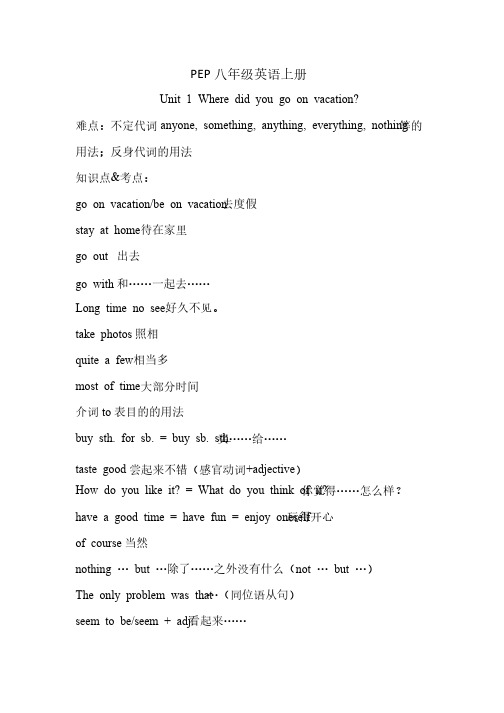
PEP八年级英语上册八年级英语上册Unit 1 Where did you go on vacation? 难点:不定代词anyone, something, anything, everything, nothing等的用法;反身代词的用法用法;反身代词的用法知识点&考点:考点:go on vacation/be on vacation 去度假去度假stay at home 待在家里待在家里待在家里go out 出去出去go with 和……一起去……和……一起去……Long time no see. 好久不见。
好久不见。
take photos 照相照相quite a few 相当多相当多相当多most of time 大部分时间大部分时间大部分时间表目的的用法介词to表目的的用法buy sth. for sb. = buy sb. sth. 买……给……买……给……taste good 尝起来不错(感官动词+adjective)How do you like it? = What do you think of it? 你觉得……怎么样?你觉得……怎么样?have a good time = have fun = enjoy oneself玩得开心玩得开心of course 当然当然nothing …but …除了……之外没有什么(not …but …)…)The only problem was that …(同位语从句)…(同位语从句)seem to be/seem + adj. 看起来……看起来……keep a diary 记日记记日记记日记 + at + 小地点小地点小地点arrive + in + 大地点大地点大地点 decide to do 决定做某事决定做某事决定做某事 try doing sth. 尝试做某事尝试做某事尝试做某事 try to do sth. 尽力做某事尽力做某事feel like 感觉到感觉到 feel like + n./ v-ing 想要……想要……ride … to …骑……到………骑……到……许多的:a lot of + 可数名词可数名词 lots of + 可数可数or 不可数名词不可数名词 I wonder that …我想知道………我想知道………我想知道…… in the past 在过去在过去在过去 enjoy doing sth. 享受做某事享受做某事享受做某事 walk around 到处逛逛到处逛逛感叹句:What + 冠词冠词 + adj. + n. + (it is) = How + adj. + 冠词冠词 + n. + (it is) start start doing doing doing sth. sth. 开始做某事开始做某事 stop stop doing doing doing sth. sth. 停止做某事停止做某事 finish finish doing doing sth. 结束做某事结束做某事because & so (不可同用)(不可同用)(不可同用) wait for …等待………等待……because of + n. a little/ a few 一些(两者的区别,以及与little/few 的区别)的区别) enough + n. / adj. + enough as + adj./adv. + as 和……一样……和……一样……one bowl of …一碗………一碗……along the way 沿着这条路沿着这条路沿着这条路 时间段+ later = after + 时间段……之后时间段……之后other, others, the other, the others, another on trip 在旅途中在旅途中find out 找到,找出找到,找出 / find 寻找寻找 / look for 寻找寻找寻找 so + adj. + that + 从句如此……以致……从句如此……以致……tell sb. (not) to do sth. 告诉某人(不要)做某事告诉某人(不要)做某事keep doing sth. / go on doing sth. 继续做某事继续做某事keep sth. + adj. 使……保持……状态使……保持……状态up and down (人)来来往往;(人)来来往往;(物)上上下下(物)上上下下in excitement = excitedly 兴奋地兴奋地come up / come out / come on / come in forget to do sth. 忘记做某事忘记做某事 forget doing sth. 忘记做过某事忘记做过某事忘记做过某事 like / dislike + n. / v-ing 喜欢/不喜欢某物/做某事做某事something + adj. ……的事情……的事情……的事情 Why not + v. = Why don ’t you + v. 为什么不……呢?为什么不……呢?Unit 2 How often do you exercise? 重点:1. How often 句型的运用;2. 2. 六个频度副词六个频度副词never, hardly ever, sometimes, sometimes, often, often, often, usually, usually, usually, always always 的差异、理解及使用;3. 频率数词once, twice 等的认识和运用;4. 一般现在时不同人称谓语形式的变化及一般疑问句的问答。
新人教新目标版八年级英语上册短语语法知识点汇总

人教版八年级英语上册短语语法知识点总结初二英语课组2019年[由我校初二英语科组根据最新考纲和近几年中考的趋势加上我校学生的实际情况,结合初二全体英语科组的力量,汇编了这一份重点总结,编好一份学案不易,望同学们能好好利用。
]Unit 1 Where did you go on vacation一、必背单词短语。
Section A1.Where did you go on vacation? (P. 1)on vacation意为“在度假”,结构“on+名词”表示“在某种状态中”。
例句:My family went to Hainan on vacation last year.2....visited my uncle (P. 1)visit此处用作及物动词,后接人或物做宾语,意为“拜访、看望”,后接表示地点的名词,意为“参观、游览”。
例句:I visited my grandmother last week.例句:Do you want to visit Shanghai?3....go with anyone? (P. 2)(1)anyone用作不定代词,意为“有人、任何人”,相当于anybody,用于疑问句和否定句中,在肯定句中用someone或者somebody。
但是anyone也可以用在肯定句中,表示“任何一个人”。
例句:Did you meet anyone friendly in that city?例句:Anyone can be helpful in some way.(2)anyone只能指人,不可以指物,后面不接of短语;any one既可以指人也可以指物,后可接of短语。
例句:You can ask any one of us about this question.4....buy anything special? (P. 2)(1)buy用作双宾语动词,表示“买”,常用的结构为“buy sb. sth.”或者“buy sth. for sb.”,表示“为某人买某物”。
(人教版新目标)八年级英语上册全册各单元知识点期末总复习讲解教学课件

3. feel like “感受到;摸起来”,后跟宾语 从句或名词。 I felt like I was a bird. 我感觉我是一只鸟。 It feels like a stone. 它摸起来像一块石头。
eg.something special; somewhere wonderful. 2.不定代词做主语时,谓语动词用第三人称单数。 eg.Is everybody here? 大家都到齐了吗?
1. get to/reach/arrive 都是“到达“的意思。
get to+sp=reach+sp = arrive at+sp(小)=arrive in+sp(大) 若他们后面要加地点副词here, there, home等,则 不需要加介词。
25、up and down上上下下 26、come up出来 27、enjoy oneself=have fun=have a good time
玩的开心
二、重要句子(语法):
1.Where did you go on vacation? 你到哪里去度假了?
I went to New York City. 我去了纽约城。
三、习惯用法、搭配
1. buy sth. for ab./ buy sb. sth. 为某人买某物 2. taste + adj. 尝起来…… 3. nothing to do but do除了……之外无事可干 4. seem + (to be) + adj 看起来 5. arrive in + 大地方 / arrive at + 小地方 到达某地 6. decide to do sth=make a decision决定做某事 7. try doing sth. 尝试做某事
人教版新目标八年级英语上册各单元重点单词和短语梳理归纳

人教版新目标八年级英语上册各单元重点单词和短语梳理归纳Unit 1 Where did you go on n?In this unit。
we learn some XXX.1.Phrasesgo on n: XXXstay at home: not go XXXgo to the mountains: XXXgo to the beach: XXXvisit museums: go to museums for sightseeinggo to summer camp: XXXquite a few: a considerable numberstudy for: learn for a specific purposego out: leave the house for activitiesmost of the time: the majority of the timetaste good: have a good flavorhave a good time: enjoy oneselfof course: certainlyfeel like: have the feeling ofgo shopping: visit stores for shoppingin the past: before nowwalk around: stroll in an areabecause of: due toXXX: a serving ofthe next day: the following dayXXX: have tea as a XXXfind out: discovergo on: continuetake photos: use a camera to capture images XXXup and down: moving in different ns come up: appear or XXX2.Sentence Structuresbuy sth。
新目标英语八年级上册1至6单元知识点总结

八年级上册1-6单元知识点总结第一单元一、应掌握的单词:1、exercise既可以做名词,也可以做动词,表示“锻炼,运动”时,是不可数名词,表示“练习,体操”时,是可数名词。
2、skateboard【动词】意为“踩滑板;参加滑板运动”,skate【动词】意为“滑冰;溜冰”,board【名词】意为“板”。
3、hardly=almost not 几乎不几乎不 4、active【形容词】意为“活跃的;积极的”,它的名词形式是activity.5、about=around大约大约 6、of course= sure=certainly当然当然 7、look after=take care of 照顾照顾 8、different【形容词】意为“不同的;有区别的” ,它的名词形式是difference.9、although=though虽然虽然 10、a lot of=lots of后面跟可数名词的复数或不可数名词。
11、must【情态动词】意为“必须”,后面跟动词原形,相当于have to.12、less【形容词】意为“较小的;更小的;较少的;更少的”,它是little的比较级。
的比较级。
二、应掌握的词组:1. go to the movies 去看电影去看电影2. watch TV看电视看电视3. surf the internet 上网上网 ,上网冲浪,上网冲浪 4.read English books读英语书读英语书5.do homework做家庭作业做家庭作业(do housework做家务事)做家务事)6.all students所有的学生100%7.most students大多数学生51-99% (= most of the students)8.some students 一些学生1-50%9.no students没有学生0%10.as for至于至于11. be good for 对什么有益对什么有益(be bad for对什么有害)对什么有害)12. come home from school放学回家放学回家 13. eating habits 饮食习惯饮食习惯饮食习惯14.pretty good非常好,不错非常好,不错15. junk food垃圾食物垃圾食物16. healthy lifestyle 健康的生活方式健康的生活方式健康的生活方式 17.kind of=a little=a little bit有点有点 18. help sb to do sth帮助某人做某事,帮助某人做某事, =help sb with sth 19. go skateboarding 去划板去划板去划板20. keep healthy=stay healthy 保持健康21. exercise=take (much) exercise=do sports锻炼锻炼22. take more exercise 做更多的运动做更多的运动 23. the same as 与什么相同与什么相同24. once a month一月一次一月一次25. be different from 不同不同26. twice a week一周两次一周两次一周两次27. make a difference to 对什么有影响对什么有影响 28. how often 多久一次多久一次多久一次29. shop=go shopping=do some shopping 购物购物30. activity survey活动调查活动调查31. eat less meat吃更少的肉吃更少的肉32. want to do sth 想做某事想做某事33. want sb to do sth想要某人做某事想要某人做某事 34. get good grades取得好成绩取得好成绩取得好成绩35. a lot of vegetables=many vegetables许多蔬菜许多蔬菜36. keep/be in good health保持健康保持健康三、 应掌握的句子:1.How often do you watch TV? 你多久看一次电视?你多久看一次电视?How often + 助动词(助动词(do 或does) + 主语主语 + do sth.?这个句型是用来提问在某一特定这个句型是用来提问在某一特定的时间里进行某个动作的次数,即“多久一次”。
人教新目标英语八年级上册Unit-3知识点归纳总结

人教新目标英语八年级上册Unit 3 I’m more outgoing than my sister.知识点一、单词1. outgoing: liking to meet other people, enjoying their company and being friendlytowards them.eg. He is more outgoing than his brother.2. both: used with plural nouns to mean “the two” or“the one as well as the other”eg. Both women were French. They were both French.Both of my sisters live in London. They both live in London.※both … and …: not only … but also …eg. Both his mother and his father will be there.3. quiet: making very little noiseeg. her quiet voice Could you keep the kids quiet while I’m on the phone? quiet: without many people or much noise; not disturbed, peacefuleg. a quiet street They lead a quiet life. have a quiet drinkquiet: (of a person) tending not to talk very mucheg. She was quiet and shy.4. win: to be the most successful in a competition, race, battle, etc.to get sth as a result of a competition, race, battle, etc.to achieve or get sth that you want, especially by your own effortseg. France won by six goals to two against Denmark.to win election, a game or a war Ok, you win. I’ll admit I was wrong.※beat: beat sb at sth. to defeat sb/ team in a game or competitioneg. He beat me at chess. the most difficult team to beat5. truly: used to emphasize that a particular statement, feeling.(用于感觉)“真诚的,诚恳的,衷心的”eg. I’m truly sorry that things had to end like this.※really: use to say what is actually the fact or the truth about sth(表明事实或真相)“事实上,真实地,真正地”eg. What do you really think about it?They are not really my aunt and uncle.used to emphasize sth you are saying or an opinion you are giving(强调观点)“确实,的确”eg. I want to help, I really do. Now I really must go.I really and truly am in love this time.used to emphasize an adjective or adverb(强调形容词、副词的语气)eg. I’m really sorry.used often in negative sentences, to reduce the force of sth you are saying(用于否定句以减弱语气)eg. I don’t really agree with that. It doesn’t really matter.“Do you enjoy the book?”“Not really”used to express interest in or surprise at what sb is saying(表示感兴趣或惊讶)eg. “We’re going to Japan next month.”“Oh, really?”※true 与real辨析:real: actually existing or happening and not imagined or pretended事实存在,非凭空想象,并非假冒的true: connected with facts rather than things have been invented or guessed 符合事实的,如实的,并非杜撰,猜测的true 还可以表示“正确的”,real没有这种用法。
新目标英语八年级上册unit_7-unit_8知识点总结
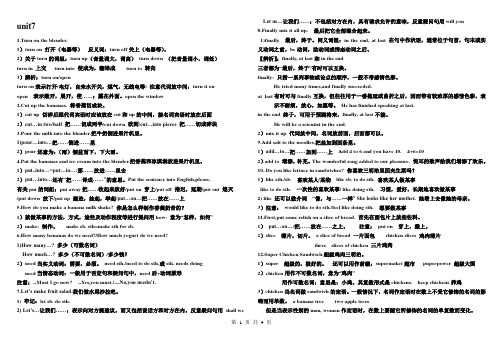
1.Did you go to the zoo?
1)Did you……?你做……了吗?是过去时态的一般疑问句,用于询问别人在过去某一时间是否做了某事。—Did you visit Mr Wang last Sunday? ----Yes,we did.
2)did做助动词,一般用于一般过去时态的疑问句及其答语和否定句中,相当于一般现在时中的do和does.在句中没有实际意义,只用来帮助完成疑问句和否定句。
other也是“其他的,别的”意思,但other是形容词,用来修饰名词时,需放在名词之前。
5.Did you win that hat?你赢了那顶帽子了吗?
辨析:win/beat
win通常跟a game, a war, a prize之类的词。beat后跟人。
6.Class 9 had a great time on the school trip.九班的学生在学校旅行中过的很愉快。
help sb. with sth.=help sb.(to) do sth.帮助某人做某事
16.First,check you have all the ingredients.首先,检查一下你是否有所有的配料。
1)check动词:检查,核对。check one’s answers
2) check名词:支票,账单。
/put down放下/put up建造,挂起,举起/put…on…把……放在……上
5.How do you make a banana milk shake?你是怎么样制作香蕉奶昔的?
1)就做某事的方法,方式,途径及动作程度等进行提问用how:意为“怎样,如何”
2)make:制作。make sb. sth=make sth for sb.
八年级英语上册知识点总结(全)

八年级英语上册知识点总结人教新目标版Unit 1 How often do you exercise?一、词组go to the movies 去看电影look after=take care of 照顾surf the internet 上网healthy lifestyle 健康的生活方式go skate boarding 去划板keep healthy=stay healthy 保持健康eating habits 饮食习惯take more exercise 做更多的运动the same as 与什么相同once a month 一月一次be different from 不同twice a week 一周两次make a difference to 对什么有影响how often 多久一次although=though虽然as for 至于activity survey活动调查do homework做家庭作业do housework做家务事eat less meat 吃更少的肉junk food垃圾食物be good for 对什么有益be bad for对什么有害want to do sth 想做某事want sb to do sth想某人做某事try to do sth 尽量做某事come home from school放学回家of course=certainly=sure 当然get good grades 取得好成绩some advice 一些建议most of the students=most students 大多数学生shop=go shopping=do some shopping 购物exercise=take (much) exercise=do sports 锻炼help sb to do sth=help sb with sth 帮助某人做某事a lot of vegetables=many vegetables 许多蔬菜hardly=not nearly/almost not 几乎不keep/be in good health保持健康二、词汇精讲1、always、usually、often、sometimes、hardly ever和neveralways、usually、often、sometimes、hardly ever和never是英语中最常见的频度副词。
人教版新目标八年级英语上册各单元重点单词和短语梳理归纳

人教版八年级英语(上)重点单词短语句子归纳Unit1 Where did you go on vacation?一、重点短语1.去度假go on vacation2.待在家里stay at home3.去爬山go to the mountains4.去海滩go to the beach5.参观博物馆visit museums6.去参观夏令营go to summer camp7.相当多quite a few8.为……而学习study for9.出去go out 10.大部分时间most of the time 11.尝起来很好吃taste good 12.玩得高兴have a good time13.当然of course 14.给……的感觉;感受到feel like 15.去购物go shopping 16. 在过去in the past17.四处走走walk around 18.因为because of19.一碗……one bowl of… 20.第二天the next day21.喝茶drink tea 22.找出;查明find out23.继续go on 24.照相take photos25.重要的事something important 26.上上下下up and down27.出来come up二、重点句型及考点1. 为某人买某物buy sth. for sb. / buy sb. sth.2. 尝起来……taste + adj.3. 看起来……look+adj.4. 除了……之外什么都没有nothing…but+动词原形5.看起来……seem+(to be)+ adj.6. 到达某地arrive in+大地点/ arrive at+小地点7. 决定去做某事decide to do sth.8. 尝试做某事try doing sth .尽力去做某事try to do sth.9. 忘记做过某事forget doing sth.忘记做某事forget to do sth.10. 喜欢做某事enjoy doing sth.11. 想去做某事want to do sth.12. 开始做某事start doing sth.13. 停止做某事stop doing sth.14. 不喜欢做某事dislike doing sth.15. 继续做某事keep doing sth.16. 为什么不做……呢?Why not do. sth.?17. 如此……以至于……so+adj.+that+从句18. 告诉某人(不要)做某事tell sb. (not) to do sthUnit 2 How often do you exercise?一、根据汉语写短语。
人教新目标英语八年级上册unit1-Unit4单元重点知识复习
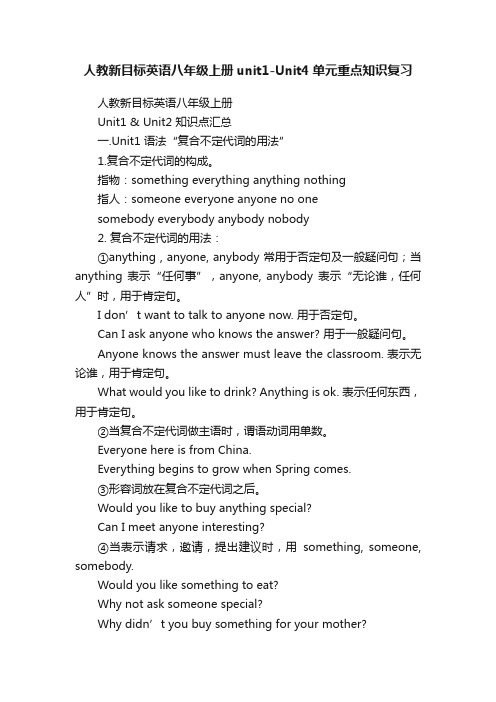
人教新目标英语八年级上册unit1-Unit4单元重点知识复习人教新目标英语八年级上册Unit1 & Unit2 知识点汇总一.Unit1 语法“复合不定代词的用法”1.复合不定代词的构成。
指物:something everything anything nothing指人:someone everyone anyone no onesomebody everybody anybody nobody2. 复合不定代词的用法:①anything , anyone, anybody 常用于否定句及一般疑问句;当anything 表示“任何事”,anyone, anybody 表示“无论谁,任何人”时,用于肯定句。
I don’t want to talk to anyone now. 用于否定句。
Can I ask anyone who knows the answer? 用于一般疑问句。
Anyone knows the answer must leave the classroom. 表示无论谁,用于肯定句。
What would you like to drink? Anything is ok. 表示任何东西,用于肯定句。
②当复合不定代词做主语时,谓语动词用单数。
Everyone here is from China.Everything begins to grow when Spring comes.③形容词放在复合不定代词之后。
Would you like to buy anything special?Can I meet anyone interesting?④当表示请求,邀请,提出建议时,用something, someone, somebody.Would you like something to eat?Why not ask someone special?Why didn’t you buy something for your mother?Unit2 语法“频率副词”How often 常用于对频率的提问,意为“多长时间一次”,其答语可以是once/ twice / three times a week; always/ usually/ often/ sometimes/ hardly ever/ never 等表示时间频率的副词及短语。
新版新目标英语八年级上册知识点总结完整版

新版新目标英语八年级上册知识点总结集团标准化办公室:[VV986T-J682P28-JP266L8-68PNN]U n i t1W h e r e d i d y o u g o o n v a c a t i o n1.go on vacation去度假vacation假期、假日=holiday,on vacation = on holiday 度假the long vacation 长假the summer vacation 暑假 the Christmas vacation 圣诞假期goonvacation/tothemountains/tothebeach/tosummercamp 去度假,去爬山,去沙滩,去夏令营2.buy anything special 买特别的东西1)buy v买;购买过去式为bought buysb.sth=buysthforsb. 给某人买某物2)anything不定代词,某事;某件东西主要用于疑问句或否定句中Do you want to buy anything for meI can’t say anything about it.3)anthing special特别的东西 adj修饰不定代词时后置4) something,anything,nothing,everything是指物的不定代词。
somebody,someone,anybody,anyone,nobody,everybody,everyone是指人的不定代词。
somewhere,anywhere,nowhere,everywhere 是指地点的不定代词。
5) 这些不定代词做主语时,谓语动词用第三人称单数 Is everybody here 大家都到齐了吗6) something,somebody,someone,somewhere用于肯定句及表示请求或建议的疑问句中,而anything,anybody,anyone,anywhere用于否定句及疑问句中。
人教版新目标八年级上册英语知识点全册

Unit1 Where did you go on vacation?重点短语1. go on vacation去度假2.stay at home 待在家里3.go to the mountains 去爬山4. go to the beach 去海滩5. visit museums 参观博物馆6. go to summer camp 去参加夏令营7.quite a few 相当多8.study for 为……而学习9.go out 出去10.most of the time 大部分时间11. taste good 尝起来很好吃12.have a good time 玩得高兴13. of course 当然14.feel like 给……的感觉;感受到15.go shopping 去购物16.in the past 在过去17. walk around 四处走走18. because of 因为19. one bowl of… 一碗……20. the next day 第二天21. drink tea 喝茶22. find out 找出;查明23. go on 继续24.take photos 照相25. something important 重要的事26. up and down 上上下下27. come up 出来28. buy sth. for sb. / buy sb. sth. 为某人买某物29. taste + adj. 尝起来……30. look+adj. 看起来……31.nothing…but+动词原形除了……之外什么都没有32.seem+(to be)+ adj. 看起来……33. arrive in+大地点/ arrive at+小地点到达某地34.decide to do sth. 决定去做某事35. try doing sth. 尝试做某事/36. try to do sth. 尽力去做某事37. forget doing sth. 忘记做过某事/38. forget to do sth. 忘记做某事39. enjoy doing sth. 喜欢做某事40. want to do sth. 想去做某事41. start doing sth. 开始做某事42. stop doing sth. 停止做某事43. dislike doing sth.不喜欢做某事44. keep doing sth. 继续做某事45. Why not do. sth.? 为什么不做……呢?46. so+adj.+that+从句如此……以至于……47. tell sb. (not) to do sth. 告诉某人(不要)做某事48 .have a good time=enjoy oneself=have fun(doing sth.)玩得痛快三、重点句子:1. Where did you go on vacation? 你去哪儿度假的?2. Long time no see. 好久不见。
- 1、下载文档前请自行甄别文档内容的完整性,平台不提供额外的编辑、内容补充、找答案等附加服务。
- 2、"仅部分预览"的文档,不可在线预览部分如存在完整性等问题,可反馈申请退款(可完整预览的文档不适用该条件!)。
- 3、如文档侵犯您的权益,请联系客服反馈,我们会尽快为您处理(人工客服工作时间:9:00-18:30)。
Unite 1【应掌握的词组】1. go to the movies 去看电影2. look after = take care of 照顾3. surf the internet 上网4. healthy lifestyle 健康的生活方式5. go skate boarding 去划板6. keep healthy=stay healthy 保持健康7. exercise=take(much)exercise=do sports锻炼8. eating habits 饮食习惯9. take more exercise 做更多的运动10. the same as 与什么相同11. be different from 不同12. once a month一月一次13. twice a week一周两次 14. make a difference to 对什么有影响15. how often 多久一次 16. although = though虽然17. most of the students=most students18. shop=go shopping=do some shopping 购物19. as for至于 20. activity survey活动调查21. do homework做家庭作业 22. do housework做家务事23. eat less meat吃更少的肉24. junk food垃圾食物25. be good for 对什么有益26. be bad for对什么有害27. want to do sth 想做某事28. want sb to do sth想某人做某事29. try to do sth 尽量做某事 30. come home from school放学回家31. of course = certainly = sure当然32. get good grades取得好成绩33. some advice 34. hardly=not nearly / almost not几乎不35. keep/be in good health保持健康36.be stressed out紧张的,有压力的37. take a vacation 去度假48.get back 回来【应掌握的句子】1. How often do you exercise? 你(你们)多久锻炼一次身体?翻译:“你们多久到工厂去一次?”“每星期两次。
”“How often do you go to the factory?” “Twice a week. ”“他们多长时间举办一次舞会?”“通常每两周举办一次。
”“How often do they have a dancing party?” “Usually, once every other week.”“他多久去购一次物?”“一个月一次。
”“How often does he go shopping?” “He goes shopping once a month.”2. “What do you usually do on weekends?” “ I usually play soccer.”“周末你通常做什么?”“我通常踢足球。
”第一个do为助动词, 在这起帮助构成疑问的作用;而第二个do则是实义动词。
翻译:What do you usually do on weekends? I often go to themovies.What does she usually do on weekends? She sometimes gohiking.3. “What’s your favorite program?” “It’s Animal World.”=What program do you like best?“你最喜欢什么节目?”“动物世界。
”4. As for homework , most students do homework every day .as for...意思是“至于;关于”,常用于句首作状语,其后跟名词、代词或动词的-ing形式(即动名词)。
如:As for him,I never want to see him here. 至于他,我永远不希望在这里见到。
As for the story,you'd better not believe it. 关于那故事,你最好不要相信。
翻译:至于我自己,我现在不想去。
(As for mys elf, I don’t want to go now. )至于那个人,我什么都不知道。
(As for the man, I know nothing about him.)5. Mom wants me to get up at 6:00 and play ping-pong with her .want to do sth. 意思是“想要做某事”;want sb. to do sth.意思是“想要某人做某事”。
如:Do you want to go to the movies with me?你想和我一起去看电影吗?The teacher doesn't want us to eat hamburgers.老师不想让我们吃汉堡包。
6. She says it’s good for my health.be good for...表示“对……有益(有好处)”;其反义为:be bad for...。
(这里for 是介词,后跟名词、代词或动名词)如:It's good for us to do more reading. 多读书对我们有好处。
Reading in bed is bad for your eyes.在床上读书对你的眼睛有害。
7. How many hours do you sleep every night?8. I exercise every day , usually when I come home from school .9. My eating habits are pretty good .这里pretty相当于very 。
10. I try to eat a lot of vegetables , usually ten to eleven times a week .try to do sth.表示“ 尽力做某事” ,不包含是否成功的意思而try doing sth.表示“(用某一办法)试着去做某事”。
如: You’d better try doing the experiment in another way.你最好试试用另一种方法做这个试验。
11. My healthy lifestyle helps me get good grades.help sb.(to) do sth.帮助某人做某事12. Good food and exercise help me to study better.这里better是well的比较级,而不是good的比较级13. Is her lifestyle the same as yours or different?=Is her lifestyle the same as your lifestyle or is her lifestyle different from yours? be the same as … / be different from …14. What sports do you play ?15. A lot of vegetables help you to keep in good health .keep in good health = keep healthy = stay healthy16. You must try to eat less meat .try to do sth.表示“ 尽力做某事” ,不包含是否成功的意思,less是little的比较级17. That sounds interesting.这是“主语+系动词+表语”结构的简单句。
sound(听起来),look(看起来),smell(闻起来),taste(尝起来),feel(觉得),seem(好象),grow(变得),get(变得)等词在英语中可用作系动词,后跟形容词作表语。
如:It tastes good. 这味道好。
The music sounds very sweet. 这音乐听起来很入耳。
The smoke grew heavier and heavier. 烟雾变得越来越浓了。
【词语辨析】一、maybe / may be1. The baby is crying she is hungry.2. The woman a teacher .maybe 是副词,意为“大概,可能,或许”,一般用于句首。
May be是情态动词,意为“可能是..,也许是..,大概是..”.二、a few / few / a little / little1. people can live to 100,but people can live to 150.2. There is time left, I don’t catch the first bus.3. Could you give me milk?a few (少数的,几个,一些)a little (一点儿,少量)表示肯定few (很少的,几乎没有的)little (很少的,几乎没有的)表示否定修饰可数名词修饰不可数名词三、none / no one1、 of the pens are mine .2、 is in the classroom.none指人或物,强调数量,用how many提问,常与of连用。
no one 多指人,强调“无人”这种状态,用who提问,不可与of连用,作主语时,其谓语动词用第三人称单数形式。
四、hard / hardly1. The ground is too to dig2. I can understand them.3. It’s raining ,the people can go outside.hard作形容词,意为“困难的,艰苦的,硬的”;作副词,意为“努力地,猛烈地”。
Hardly意为“几乎不”。
Unit 2 What’s the matter?【复习目标】●掌握身体各部位名称的英文表达方式●能表述身体的种种不适以及对他人身体的种种不适给予适当的建议【语言目标】●What’s the matter? I have a headache.●You should drink some tea. The sounds like a good idea.●I have a sore back. That’s too bad .● I hope you feel better soon.【重点词汇】● head, nose, eye, ear, tooth, neck, stomach, back, leg, arm, foot, throat● thirsty, stressed out,/ dentist, lie, rest, honey, water, illness, advice.● cold, fever, headache, toothache, stomachache, sore throat【应掌握的词组】1. Have a cold 感冒2. sore back 背痛3. neck and neck 并驾齐驱,齐头并进4. I have a stomachache 我胃痛= I have got a stomachache = There is something wrong with my stomach= My stomach hurts = I have (got) a pain in my stomach5. What’s the matter? 怎么了?= What’s the trouble (with you)? = What’s your trouble?= What’s wrong (with you)?= What’ the matter (with you)? =What has happened to you?= Is there anything wrong (with you)? = what’s up?6. sore throat 咽喉痛7. lie down and rest 躺下休息8. see a dentist 看牙医9. drink lots of water 多喝水10. hot tea with honey 加蜂蜜的热茶11.That’s a good idea 好主意12.That’s too bad 太糟糕了13.I think so 我认为如此14. I’m not feeling well. 我觉得不太舒服= I’m not feeling fine/all right. = I’m feeling ill/sick. =I feelterrible/bad.= I don’t feel well.15. get some rest 多休息16. I have no idea = I don’t know 我不知道17. stressed out 筋疲力尽18. I am tired 我累了He is tired. 他累了19. a healthy lifestyle健康的生活方式20. traditional Chinese doctors传统中医21. a balance of yin and yang阴阳调和22. you have too much yin.你阴气太盛23. to eat a balance diet饮食平衡24. healthy food 健康食品25. stay healthy 保持健康=keep healthy=keep in good health = keep fit26. enjoy oneself (myself, yourself, herself, himself, themselves, ourselves, itself反身代词) 玩得高兴,过得愉快=have a good time = have a wonderful time = have fun27. enjoy sth. =like sth. (名词)喜欢某物,enjoy doing sth.喜欢做某事=like doing sth practice doing sth.练习做某事,mind doing sth. 介意做某事,finish doing sth.完成某事,give up doing sth.放弃做某事,can’t help doing sth.忍不住做某事,keep doing sth. 坚持做某事. (keep on doing sth. / keep sb. doing sth. )be busy doing sth. 忙着做某事be used to doing sth.习惯于做某事make a contribution to doing sth.为..做贡献go on doing sth. 继续做某事forget doing sth.忘记做过某事remember doing sth. 记得做过某事spend....(in) doing sth. 花(时间)来做某事prefer doing sth.to doing sth.比起(做...)来更愿意(做...)28. at the moment = now 此刻29. Host family 东道家庭30. Conversation practice会话练习31. I’m sorry to hear that.听到此事我很难过【应掌握的句子】1.What’s the matter? I have a bad cold. 你怎么了?我得了重感冒。
